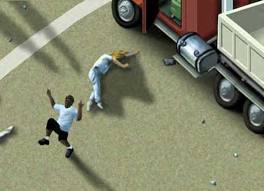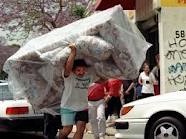For those that tracked my last post, I’m taking a break from the series I’ve been doing on statistics, interpretation, and knowing to do some reflection on the LA riots which occured 20 years ago (as of Sunday, April 29th).
In my last post I shared some of my recollections of how I experienced the LA Riots as a high schooler going to school in urban Long Beach, site of some of the rioting activity. In this post I want to reflect on more of my social context and how I processed the meaning of the riots…or didn’t if that be a better description 🙂
From age 10 to 18 in Long Beach I had a very diverse community of friends, mostly provided through the educational opportunities mentioned in the last post. In high school that expanded even more so because of the addition of playing high school baseball as well in addition to the diversity of the academic program I was in.
Some of my fondest memories of high school were Friday afternoons in the fall. I hosted a Friday afternoon tackle football game at the park near my house. There would be anywhere between 16 to 20 guys usually on Friday. We’d beat each other up, we’d order pizza at my house, then we’d all head over to watch our high school football team play Friday night (we’d all usually be limping pretty good).
My mom has shared and spoken a couple times using these afternoon’s as an example of what was a big part of her own cross-cultural development. Every Friday in the fall she had a high school United Nations in her home of sorts. If I could paint a picture – I remember once in high school observing that out of about 20 or so guys, there were actually 13 different cultures or ethnicities represented. If you were there you’d have seen white, black, hispanic, Indian (South Asian), Vietnamese, Chinese, Cambodian, Japanese, Filipino, and several others represented. That was my normal for most of my adolescence. And I loved it. Looking back, God used those guys in my life in some great ways then and to prepare me for how I live and what I do now.
We could have been the poster children for what some wish was true for us today – the post-racial society. Except we weren’t post-racial. We were 16, 17, 18 and doing life and we recognized cultural difference but rarely did we enter into those realities. So none of us would blink if someone called home and instinctively switched into a different language. None of us really blinked if we visited someone’s house and either had to take our shoes off or saw a shrine or anything else. It was normal to me, but my understanding was minimal. That being said – what we did experience put us light years ahead of the curve compared to what many our age at the time experienced throughout the country and I’m really thankful for it.
There were great friendships and a great loyalty with my friends, but I didn’t really know their stories – really. I wish I had a greater capacity at the time to inquire and learn. High school is an interesting sub-culture (then and now I’m sure). When in high school, we knew that we were experiencing something cool and at times even almost utopian. We had several cross-cultural fair’s and celebrations on campus, culture and ethnicity was honored and lifted up like in few places at the time. But, at the end of the day – everybody usually goes back to their own worlds in which culture and ethnicity play a huge role in shaping and defining who we are.
 So what does this have to do with the riots? 🙂
So what does this have to do with the riots? 🙂
My junior year of high school a group of my friends and I (maybe about 7-8) had to do a creative project that reflected insights from the year’s literature we had to read. The sketch comedy show ‘In Living Color’ was at the height of its powers at the time, so the idea was born to do something similar. So 7-8 of us 17 year old high school boys (at least 5 different ethnicities involved) began to create a half hour creative/comedic sketch of the year.
The riots had been one month earlier and as I remember, there were multiple things done that either mocked aspects of the riots (i.e. the looting) or even made light of some of the racist overtones. Looking back, it’s a clear sign that we were all very much impacted by what we had experienced, but we perhaps were limited in our ability to grasp the realities of it. I’ll give you the most clear example as it illustrates what I’ve been reflecting on.
Somehow in our project there ended up being a sketch that involved simulating the riots and in particular the centerpiece of violence in some ways – the Reginald Denny beating. As one of the only two white guys in the group it was decided that I would drive my car into an area where others would be “rioting” and then they would pull me out of my car and pretend to knock me as the white guy senseless. Looking back, it’s a little uncomfortable for me I’ll be honest and it wouldn’t fly in classrooms today. It fact, it took a long time, maybe the full 20 years since to really even identify my honest response to “playing” Reginald Denny in such a sketch. It surfaces things I was nowhere near being able to digest at the time. Much of what the LA Riots “meant” was obviously still being kept very distant from our engagement with it. I just see things so differently now than I did then.
I’m not writing this to indict what me and my friends did. We had a fantastic time at the time and it was very memorable from a friendship standpoint 🙂 But I think what it illustrates is that we didn’t know what to do with all the uncomfortable elements of the riots or the complex dynamics or elements to what had happened – so we made fun of it. We as people do that sometimes – seventeen year olds maybe more so than others.
As I look back, the LA Riots were transformative for me in some ways – because I remember asking myself questions I had never asked before. I saw dynamics (fear, greed, power, anger) that I hadn’t been as sensitive to before. But it also wasn’t transformative for me at the time because I was still quite young and immature and lacked some of the tools to really understand the link between culture, ethnicity, wealth and power.
I would guess most, if not all, of my friends at the time now would have a different response or perspective on the riots and our engagement over it would differ greatly. Society has progressed greatly (though not as quickly as needed in some places) in its awareness of culture and race and over time we’ve all grown up and probably all have had to wrestle with our own ethnicity in different ways.
I share this story or reflection because it’s a reminder to me that unity in diversity is not an external thing. Cultural awareness does not necessarily follow from having a bunch of different types of people together. My friends and I shared an experience, all within the context of our great diversity, that was awesome and it has no doubt shaped all of our lives as a result. I’m grateful to them frequently as I think of their impact on me. They did contribute to my cultural awareness, but there were places we didn’t go and things we didn’t really learn at the time (which is ok, we were young) and that was exposed by the LA Riots in a lot of ways. At one level, we were living the post-racial dream. At deeper levels, we still were in our own ethnic paradigms and lifestyles with maybe limited range to really connect with other realities, which no doubt affected much of how we experienced things.
 There were comedic images in the coverage of the riots – watching people try to transport huge TV’s on shopping carts or skateboards for one. There were so many images that if you lost context, could be extremely comical. But what happened has grown less funny to me over the years. A lot of real life pain and a lot of human sin spilled out into open. Lives were lost, livelihoods were ruined, and communities were ravaged.
There were comedic images in the coverage of the riots – watching people try to transport huge TV’s on shopping carts or skateboards for one. There were so many images that if you lost context, could be extremely comical. But what happened has grown less funny to me over the years. A lot of real life pain and a lot of human sin spilled out into open. Lives were lost, livelihoods were ruined, and communities were ravaged.
We can live life in places where we want to believe certain things are true. But events like the LA riots, or even more recently the Trayvon Martin case, draw out many of the underlying realities in society. In such moments we can enter into them and learn or we can distance ourselves through denial, hollow philosophy, or even humor. I see moments like this at different times of my life and I’ve responded in different ways. I hope I can continue to enter into the truth and the big picture moving forward rather than retreating into my own world.
Do you have moments like this that test your capacity to engage the larger truth of the matter?
What do you do in those moments?
In the next post I want to make some connections moving forward – using Rodney King’s famous exhortation, “Can’t we all just get along?” as a jumping off point.
